"NPI is helping to resettle over 200 Hmong refugee families recently relocated to our area from Laos. The Hmong assisted the U.S. during the Vietnam War. Thus, Lao and Vietnamese communist forces have sustained a revenge-type campaign of genecide against the Hmong. The Hmong continue to flee Laos Most of these Hmong refugees generally desire to farm. NPI is therefore providing training in sustainable agriculture techniques such as evidenced in the photos below. In additioin NPI is providing training in entrepreneurship to help the Hmong start their own businesses. For the entreprenurial training, NPI is now using course materials developed by Accion---as well as an Inventor's Techniques program created by NPI's President, David A. Nuttle.( For purposes of this briefing, only introductary materials are shown.)"
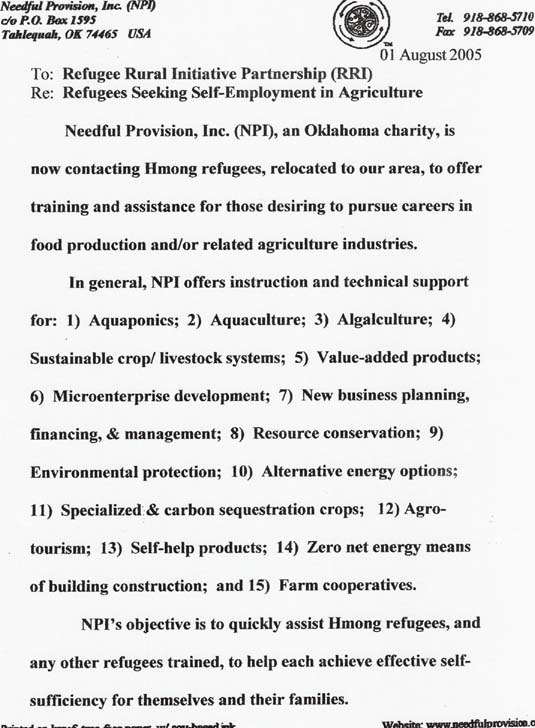
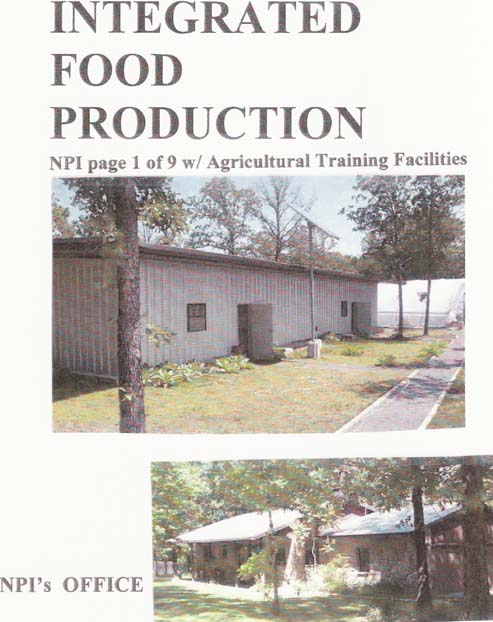
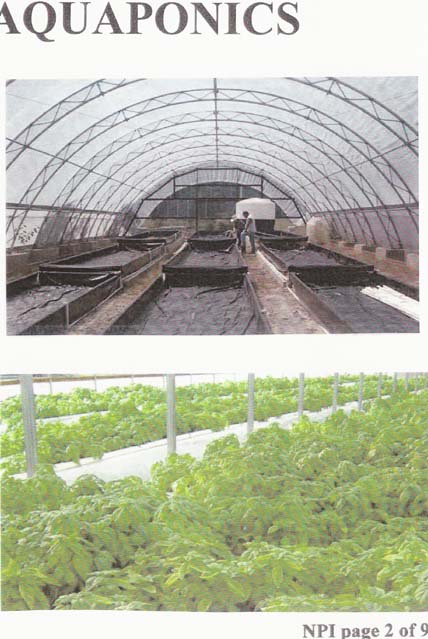
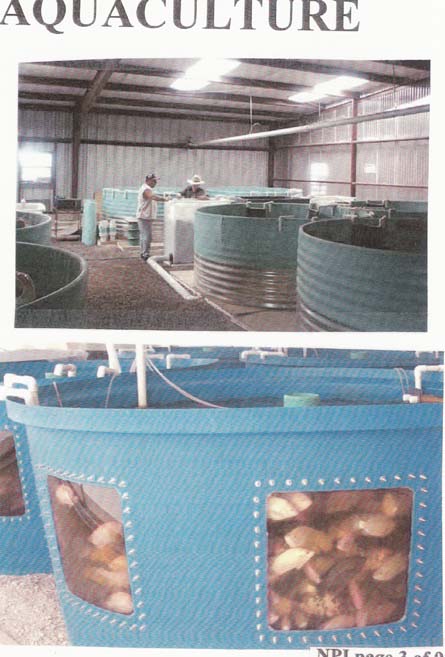
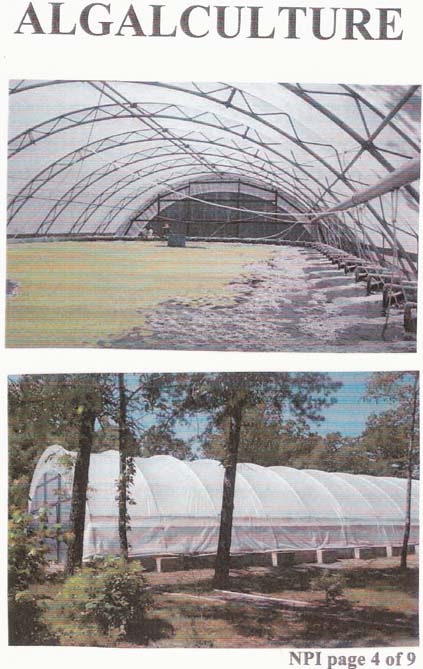
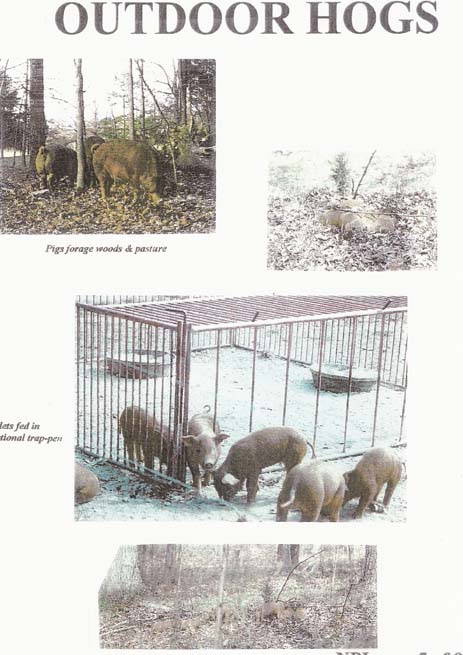
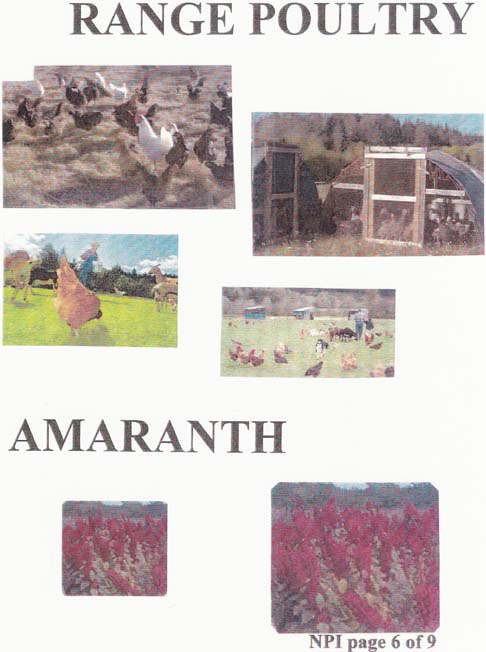
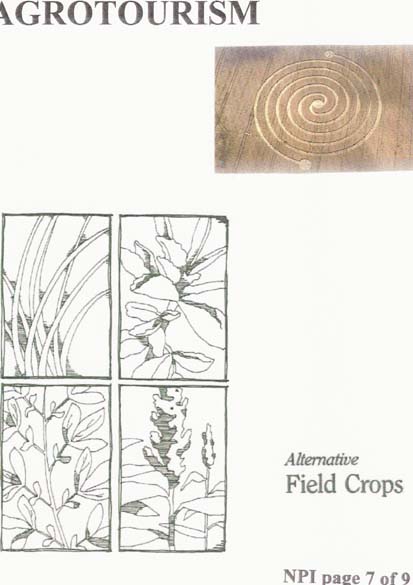
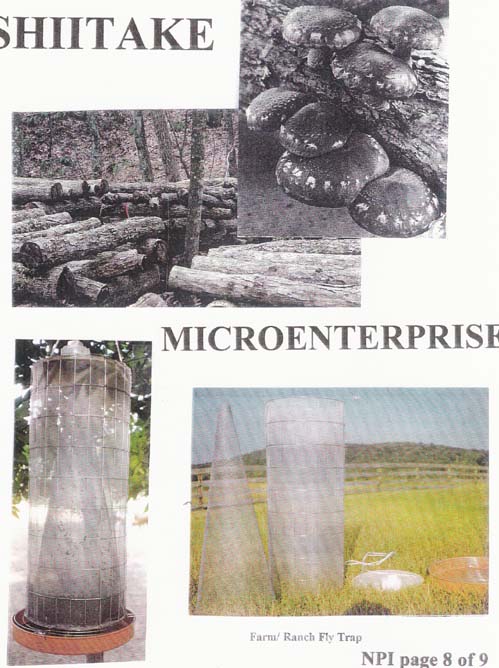
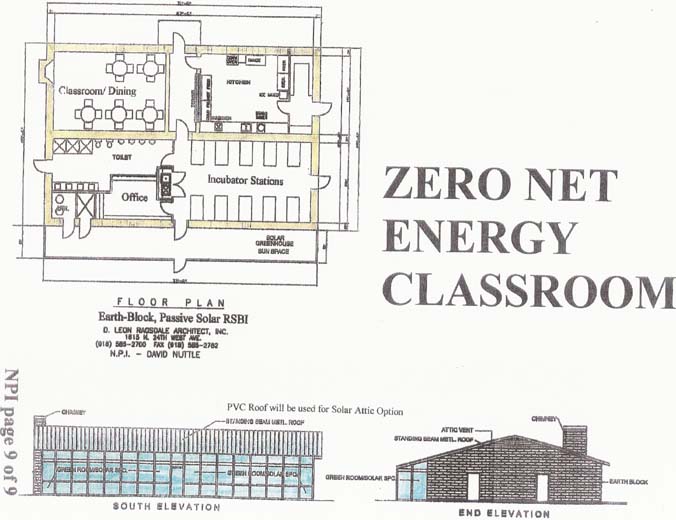
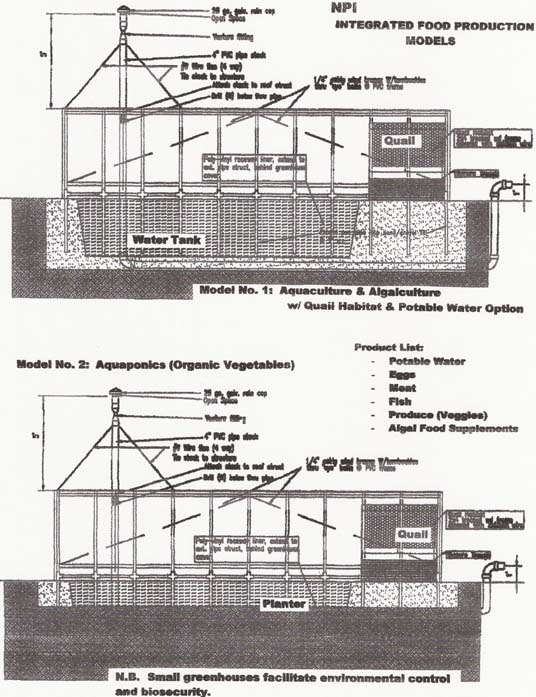
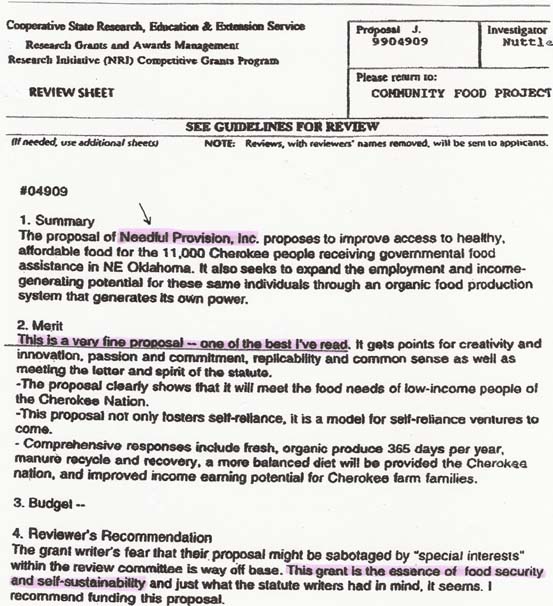
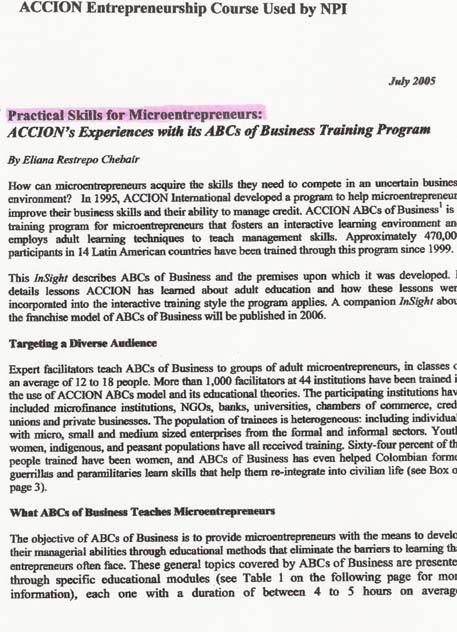

29 August 2006
Needful Provision, Inc. (NPI) Tel. 1-918-868-5710
P.O. Box 1595; Tahlequah, OK 74465 USA Fax 1-918-868-5709
Email: npiinc2000@aol.com URL: http://www.needfulprovision.org
NPI Project Manager: David A. Nuttle, President (Contact information shown above.)
Overall Project: “The Refugee Rural Initiative Value Chain Approach towards Raising Incomes and Developing Markets for Refugee Farmers and Food Sector Entrepreneurs”
(as coordinated by ISED Solutions)
NPI Project Title: “Refugee Farmers & Food Entrepreneurs Ozark Area Value Chain-type Innovations for Sustainability”
Target Population & Need: In the area known as the Ozarks
(NE Oklahoma,
NW Arkansas, and SW Missouri), there are now not less than 580
Hmong (Asian) farmers, plus another 120 farmers who are Lao,
Vietnamese, or Mexican ---for a total of 700 relatively new/
probable refugee farmers. Over 98 percent of these refugee farmers
have USDA/ FSA guaranteed farm loans and FSA has the names and
addresses of each farmer. NPI’s staff has held meetings
with over 200 of these farmers, and visited more than 40 of
their farms to document needs as described herein. Nearly 85
percent of these refugee farmers have purchased old poultry
farms (by means of FSA guaranteed farm loans), and they are
engaged in contract poultry production for large poultry companies
such as Tysons. Almost none of the subject refugee farms are
diversified in any way.
In general, the refugees paid far too much for these farms since
they had no real knowledge of farm real estate values. Moreover,
the refugees were usually given greatly inflated farm income
data ---to help convince them that they would have sufficient
cash flow to provide debt service, and still make a living.
FSA did not require that refugee farmers have farming experience
or agricultural/ business training. Moreover, FSA did not review
most farm loan guarantee applications the lender banks submitted
for refugee applicants. As a result of numerous mistakes, deception,
and false information, 17 of these refugee farmers have been
forced to declare Chapter 12 bankruptcy, and three have declared
Chapter 7 bankruptcy. (The Henry Law Firm, of Fayetteville,
Arkansas, can provide documentation on most of these bankruptcies.)
In the absence of extensive training in farm/ financial management,
value chain innovation, and dramatic/ effective income diversification,
another 40 refugee farmers are expected to have no other choice
but to declare bankruptcy in the next 6 to 12 months. Higher
energy costs, increasing interest rates on farm loans, and more
costs for waste management, may actually increase the number
of bankruptcies. (Please note that nearly all of the said refugee
farms were purchased after 2002.)
Added to the above problems, there are two active Neo-Nazi groups in the Ozarks ---and they are attacking some of the refugee farmers. In July 2006, Cindy Thao lost her farm home and three poultry houses in a probable arson fire. Shortly before that Jada Vang, and her family, were forced to abandon their farm due to sustained attacks by means of rifle fire. In another incident, a local gang attempted to kill a Hmong youth via a severe beating. All the above incidents have been directly or indirectly linked to the
Neo-Nazis. Although this is a non-agriculture or non-production problem, this type of real threat increases operating costs due to the added expenses for security systems.
II. Planned Interventions w/ Background: USDA/ ERS reports that 71 percent
of contract poultry producers, in the U.S., earn less than a poverty level income for the area(s) where they operate. In the case of subject refugee farmers, they have purchased old poultry farms for an average of $570,000.00 ---and they have farm mortgages for an average of 88 percent of this price. Most of these refugee farms have 6 (six) poultry houses, and a net income potential (under good management) of $34,000.00 before any debt service. When debt service is made, very few of these refugee farmers have enough remaining income to pay living expenses. Most refugee farmers have survived by using savings, borrowing more money from relatives, and by one spouse finding employment off-farm. In brief, farm profitability seldom if ever exists on subject refugee farms.
Typically, subject refugee farmers have land and other available assets that could be used to provide income diversification. NPI will instruct these farmers in the production of organic range poultry, as well as sheep, goats, hogs, cattle, vegetables, herbs, flowers, mushrooms, specialty crops, and other products having known local demand. For all of these products, the refugee farmers will start essentially at the very beginning of the value chain. NPI will assist the refugee farmers in development of value-added food products for direct delivery (under contract) to schools, hospitals, retirement homes, local organic food cooperatives, Asian Super Markets, and Farmers Markets. As necessary, some food processing services and safety inspections will be contracted for. NPI will help develop contracts with wholesale and retail buyers for
fresh foods and value-added products. One example includes an agreement with a local school, Oaks Mission, to purchase fresh organic foods (from refugee farmers) in daily quantities needed to support an organic school lunch program. In brief, the plan is to help refugee farmers profitably enter value chains at any point.
Additional training will be provided by NPI to further help increase profits on refugee farms. This added instruction will include: 1) Farm management; 2) Record keeping & financial management; 3) Marketing & merchandising; 4) English language proficiency; 5) Determination of land values, and land acquisition; 6) Financing options; 7) Technical assistance & training; 8) Collaborative relationships; 9) Organization and management of farm cooperatives, as well as mini-cooperatives; 10) Risk management techniques; and 11) Business plans and Farm & Home Plans. (Since refugee farmers typically do not function well in large cooperatives, several mini-cooperatives will be used to support a large cooperative: e.g. 5 (five) Hmong farmers joining together to assist each other with outdoor, humane, organic hog production ---to provide pork to a larger parent cooperative providing numerous organic foods for a school lunch program.)
Interventions will also include NPI’s training and demonstration of innovative solutions to specific problems currently reducing farm profitability. Passive solar heating and cooling methods, as well as alternative energy production, will be taught as a means to reduce energy costs. Special air filters will be introduced as a way to reduce dust and odors in poultry houses while providing increased biosecurity. Methods shall be demonstrated on making a nutrient “tea” and compost fertilizers from poultry litter, as an efficient and economical means of effective waste management. The demonstration will also show how the nutrient “tea” may be used for aquaponics-type vegetable production. NPI will teach resource conservation and savings as another way to increase profitability. Moreover, trainees will be encouraged to start Individual Development Accounts (IDAs).
Refugee Beneficiaries: On a national basis, over a period of
3 to 5 years, we
expect several hundred refugee farmers to indirectly benefit
from the models of farm profitability created by NPI’s
project. In the Ozarks, within 5 years, nearly every one of
the 700 probable refugee farmers or entrepreneurs will directly
or indirectly benefit from NPI’s project as herein stated.
With a budget limitation of $73,000.00 (from ISED) ---and with
$375,000.00 of in-kind support from NPI--- 192 confirmed refugees,
Ozark area farmers and/or food sector entrepreneurs should fully
benefit from the 12-month project effort by NPI. After the ISED-funded
project ends, NPI will sustain the effort with its own resources
until such time as all of the said refugee farmers/ entrepreneurs
(who desire training) receive NPI’s training program as
herein outlined.
IV. Current Initiatives & Capacity: As of this date, NPI
has not implemented the project as proposed. NPI has acquired
and developed a 50-acre training site located in the Ozarks
(Cherokee County, Oklahoma), for the purposes of supporting
this project in support of refugee farmers/ entrepreneurs. This
facility includes training models for aquaponics, aquaculture,
algalculture, sustainable crop and livestock production, niche
crops, mushrooms, value-added products, and energy/ resource
conservation systems. A
biosecure, solar heated and cooled poultry house is pending construction for use as yet another innovative training model. The algalculture system may also be used to train refugee farmers in algal-biodiesel production. NPI’s staff has extensive experience in the teaching of refugee farmers/ entrepreneurs in the subjects listed. Supplemental staff is available from NPI’s similar training centers in Mexico, Kenya, and India. NPI also has cooperative agreements with a number of universities, labs, and national labs. David A. Nuttle, NPI’s President and Founder, worked with the Hmong and Lao for two years, in Laos ---and with the Vietnamese and Montagnard for three years, in Vietnam. NPI’s staff has worked with subject refugee farmers for nearly three years, in the Ozarks. Our COO, Charles A. Gourd, Ph.D. is a specialist in technology transfer to indigenous (tribal) populations, and has worked with the United Nations on such efforts. NPI’s Director of Training, Karen M. Lees, has successfully planned, written, and directed instructional programs for minority and refugee populations. In addition, NPI has two Hmong staff members, Tou Vang and Youa Yang, who will assist in language translation as well as providing some instruction. (Both of the Hmong are very well qualified for their roles.)
V. Collaborators: Oklahoma State University, and Langston University, will provide some instructional support. Oaks Mission School (Oaks, OK) is cooperating on the development of organic school lunch programs using refugee produced organic foods. Ozark Natural Foods Coop is assisting with market development. The Rural Smallholder Assoc. (a farm coop NPI helped organize) will work to assist refugee farmers diversify their production. USDA/ FSA is now working to help some refugee farmers obtain more favorable farm loan terms from banks. USDA/ RMA has been asked to provide additional funding support, so proposed training efforts (for refugee farmers) may be expanded. FarmTek is supporting work on biosecure and solar powered farm buildings. Research Triangle Institute (RTI), & Prism Rain, LLC, are assisting with commercialization of algal-biodiesel production. Hmong National Development (HND), and the SE Asian American Farming Association (AR), are being asked to help coordinate said training for refugee farmers/ food sector entrepreneurs who are Hmong, Lao, or Vietnamese.
VI. Operational Plan(s): NPI’s operational plans (herein stated) were developed after completion of a detailed study of problems and needs of subject refugee farmers and food sector entrepreneurs. The strategy for training refugee farmers/ entrepreneurs must necessarily be based on an individual tutorial basis supplemented by instructional DVDs on the subjects heretofore listed. (DVDs will be available with English language or the appropriate language for the refugee being trained.) This individual approach is dictated by an extreme variation of educational and employment experience, as well as varied levels of English language proficiency. Each refugee will receive training in the priority
areas essential for financial success; e.g. Farm & Home Plans, business and marketing development, record keeping, financial management, and so on. Each refugee farmer will
select, and NPI shall approve, one or two farm diversification enterprises appropriate for their farms. NPI will then provide training, technical assistance, and marketing support to each of these refugee farmers. Food sector entrepreneurs may select from any of the above training, as well as specialized training for the value-added or other food related product(s) being developed. Each entrepreneur will also receive technical and marketing support as appropriate. All instruction and some on-the-job-training will occur at NPI’s 50-acre training center in Cherokee County, Oklahoma. Technical support will usually be provided on refugee farms or at the entrepreneur’s place of business.
Refugees are not trained in groups due to the historical conflict
between the Lao, Vietnamese, and Hmong ---as well as between
various Hmong clans. The Mexicans
also tend to have conflicts with the Asians. This provides yet another reason for NPI’s tutorial training approach as opposed to group instruction of any type. In addition, any attempt at group instruction or large group organization is generally self-defeating when attempting to work with subject refugee populations. This is why NPI uses mini-coops working independently to accomplish the goals of a larger coop. NPI’s tutorial approach, use of self-teaching aids (the DVDs), and small group organization (formed by those refugees who can work together on friendly terms), helps to eliminate the above said barrier to progress. By primarily using an individualized approach, NPI seeks to be effective and successful in achieving the heretofore-stated outcomes. By training and assisting 192 refugee farmers/ entrepreneurs annually, in the effective manner developed by NPI, there is a real opportunity to help these individuals achieve profitability for their farms and/or food sector businesses.
Match: As indicated above, NPI is providing use of a 50-acre
training facility
valued at $375,000.00. In addition, NPI will be providing refugee
farmers/ food sector entrepreneurs with the royalty-free use
of over $3.1 million in proprietary technology developed and
owned by NPI. An example of such technology is NPI’s “green”
(low-cost), biosecure, and solar heated/ cooled poultry house
or livestock barn. The minimum value of this in-kind to cash
match is estimated to be 9:1 or $657,000.00 to $73,000.00 (provided
by the ISED grant to NPI.) Using NPI’s $220,000.00 cash
grant from an E.U. foundation (see below), the cash to cash
match will be over 3:1. Overall NPI’s match is 12:1, greatly
exceeding ISED’s requirement of 3:1. Further details will
be provided upon your request. As may be necessary, an appraisal
of in-kind property may be soon obtained by NPI. In a recent
audit, to include inspection of NPI’s facilities, IRS
had no changes to NPI’s estimates for its training center
value.
Budget: The total project budget is $950,000.00 (w/ $73,000.00
cash from
ISED, $657,000.00 in-kind from NPI, and $220,000.00 cash from
an E.U. foundation). The total cash budget is $291,840.00 ($57,600.00
for trainee per diem; $91,900.00 for training model operations;
$26,400.00 for training DVDs; $98,200.00 for staff salaries;
and $17,740.00 for travel and overhead.) With 192 trainees,
per trainee cash expenses will be an estimated $1,520. ---or
an hourly rate cost of $19.00 (for an average of 80 hrs. training
or technical/ marketing support for each trainee). Cash to be
provided by ISED’s grant, in the amount of $73,000.00,
will pay 25 percent of these hourly costs. The total remaining
costs of $218,840.00 will be paid from said $220,000.00 cash
grant (to NPI) from the E.U foundation ---a foundation desiring
to remain totally anonymous. One of the Directors of this foundation
is Eugene Mxxxxxx, a German acquaintance of NPI’s President
(David A. Nuttle).
Expected Results/ Evaluation Procedure: NPI expects to save
55 refugee
farms/ food sector businesses (in the Ozarks) from bankruptcy,
in the process of making 192 refugee farms/ businesses profitable.
At the same time, we expect to create a model that may be used
to make refugee farms/ businesses profitable throughout the
U.S. As an added benefit, subject project will greatly improve
community food security (in the Ozarks), while providing more
healthful diets with local, fresh, organic foods. Project efforts
such as organic school lunches, is expected to improve student
health and overall performance, while reducing the damages from
diseases like diabetes.
NPI’s staff will collect data on the profitability of subject refugee farms and food related businesses prior to training (for each trainee), as well as one and two years after training. Schools participating in NPI’s organic school lunch programs, such as the Oaks Mission School, will carefully document student performance and various health indicators prior to start ----- and throughout two school years with students receiving organic school lunches with foods provided by refugee farmers. As refugee food sector
enterprises achieve success as a proven result of NPI’s efforts, the number of new jobs created will be fully documented. As necessary, NPI will contract with an independent and qualified third part evaluator to examine NPI’s evaluation data, and conduct random interviews with project participants.
NPI’s Commitment(s): NPI appreciates the opportunity
to be a part of the
Rural Refugee Initiative (RRI), with its network of nonprofit
community based and faith-based organizations serving refugees.
In this context, NPI will assist with: 1) Facilitation of collaborations
and partnerships with refugee service providers and USDA agencies;
2) Assist agencies redesign economic development programs to
better fit the needs of food sector entrepreneurs; 3) Expand
the network of agencies serving rural refugees; 4) Support market
driven activities that remove barriers, provide measurable positive
outcomes, and raise refugee farm, food sector enterprise revenues
and profitability via value chain interventions; and 5) Develop
information and other resources to help the refugees access,
successfully operate, and achieve profits along agricultural
value chains.
In addition to the above, NPI is committed to the following: 1) Sending our PI (Nuttle) to attend a 3 (three) day RRI planning meeting hosted by ISED; 2) The collection, maintenance, and reporting of project data and progress on a quarterly basis; 3) Assisting ISED Solutions to identify and help translate necessary tools and technical assistance information; and 4) Identification and reporting of impacts on local rural communities as refugee producers begin to assimilate into Ozark area communities.
XI. Supplemental Effort(s): Not less than 70 of the subject refugee farmers were cheated by sellers, realtors, appraisers, banks, and/or closing agents in the process of buying old, over-valued poultry farms in the Ozarks. The refugee farmers, with some indirect support from NPI, are working with local law firms to file tort complaints in an attempt to recover some established and documented damages. The Henry Law Firm alone has filed 7 (seven) such tort claims for Hmong farmers. These are necessary legal actions to help reduce the numbers of refugee farmer bankruptcies, and help to deter such fraud designed to cheat other refugees buying farms in the Ozarks. In addition, these tort cases may be used to teach refugee farmers and entrepreneurs so they may act to avoid being cheated in the future.
Large poultry companies, such as Tysons, have tended to often cheat refugee farmers engaged in contract poultry production. Feed and propane deliveries may be short of what is charged. When inferior chicks are hatched in error, these will often be delivered to refugee growers in the belief that they will not notice. In some cases, some of the birds (broilers) produced by the grower are intentionally not counted or weighed when they go to market. In brief, the poultry companies tend to abuse refugee contract growers because they believe refugees will not complain. NPI will be working with Gale Mason, USDA’s Trade Practices Chief, in an attempt to resolve various issues with the poultry companies. Security-type systems being planned and developed to help protect refugee farms from arson attacks, by local Neo-Nazi groups, may be used to help document cheating by Ozark area poultry companies.
XII. Local Attitudes: NPI’s staff has conducted extensive interviews to determine general population attitudes about refugee farmers in the Ozarks. The people who are relatively new to the area tend to have no objections to the influx of refugee farmers into the Ozarks. Those persons who are long-time residents, of the Ozarks, are often isolationist and want the refugee farmers to return to their own countries. Very few local people know who the Hmong are, or why they were forced to leave Laos due to the Lao communist’s campaign of genocide against their peoples. Local Neo-Nazi groups, who have long used remote areas of the Ozarks as a safe haven, are conducting various hate crimes against all local refugees ---and they make an effort to get local citizens to share their feelings of hatred. Overall, attitudes about the refugees are a balanced mix of hatred, indifference, and empathy based upon personal perspectives about whom the many refugees are, and why they are now here. Information and cultural awareness programs are needed to help improve attitudes toward refugees. Such efforts are important to local marketing if we want more of the locals to seek farm and value-added products from the refugee farmers/ entrepreneurs in the Ozarks.
Submitted by: David A. Nuttle, President
N.B. Minnesota Food Association, and others, will be given the opportunity to provide training DVDs (in their special areas expertise). See Exhibit A, attached, for details.
Exhibit A
PLAN FOR TRAINING DVDs
----------------------------------------
Hmong and other refugee farmers have urgent training needs related to a variety of subjects. Yet, most of these farmers have poultry production contracts and obligations that act to prevent them from spending the necessary time away from their farms to acquire needed training. NPI’s solution is to create a number of training DVDs in the Hmong language, or other appropriate languages, with English subtitles. Several well-qualified organizations, as indicated below, will assist in the creation of these DVDs.
Sting, a large security company, will provide a DVD on farm security to help defend
against the Neo-Nazi threat. Farm security systems will also help to document theft by
poultry companies as related to “short” deliveries of feed and propane. Henry Law Firm
will provide a DVD on the use of Chapter 12 bankruptcies as a means to prevent any foreclosures ---and achieve any necessary financial reorganization. NPI will provide a series of training DVDs related to farm management and income diversification/ value- added types of enterprises to provide farm profitability.
Hmong National Development (HND) is expected to provide DVDs on risk management subjects. RAFI and FLAG may provide DVDs related to contract farming subjects, and relationships with poultry companies. Minnesota Food Association (MFA) will provide DVDs related to other training needs such as Farm and Home Plans, farm record keeping, tax returns, and other areas. As appropriate, and as unique training needs are discovered, other groups may also be asked to prepare DVDs on special subjects. Langston Univ. and Oklahoma State Univ. (OSU) are expected to make some of these special DVDs.
The budgets for subject DVDs are yet to be determined. Sting is expected to donate its DVD. HND has a grant from USDA/ RMA, but does not have funds to make its DVD. Some of the other groups, providing DVDs, may pay for part or all of the cost of making said training DVDs. Otherwise, NPI will pay for making DVDs in support of the training objectives herein stated. A total of $26,400.00 has been budgeted for 11 total DVDs, and NPI is prepared to add to this amount (from NPI funds) as may be necessary.
-------------------------
N. B. 1) A survey of Hmong and other refugee households indicates that nearly all have TVs & VCRs, and have established viewing habits for free time(s). When asked, the refugees who were interviewed indicated that they would view training DVDs if there was any real hope of improved farm profitability (due to lessons learned). Over 85 percent of the Hmong who were interviewed indicated that training DVDs should be in the Hmong language. Subject DVDs were planned using the above information along with a careful analysis of actual training needs for Hmong and other refugee farmers.
2) Ironwood Films, a film company making training DVDs for
Native American tribes, will assist in making the above said
DVDs, at their cost. As a general rule, this film company films
for 20 hours, and edits for 40 hours, to make a 20-minute training
DVD. At $25, per hour, their costs are $1,500.00 per DVD. An
additional $900.00 will be needed, per DVD, to pay travel, filming
set-up, and translation costs.
